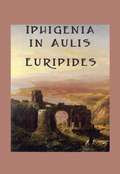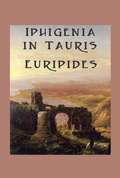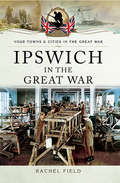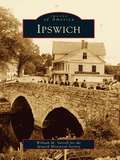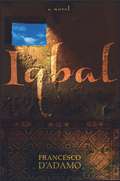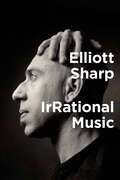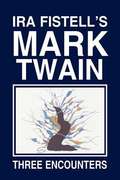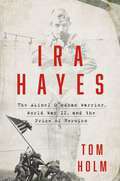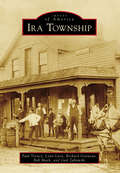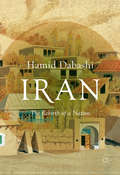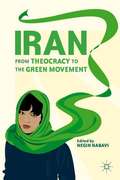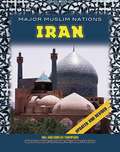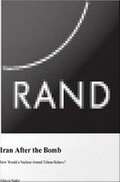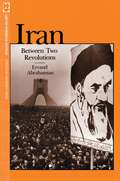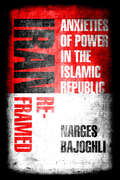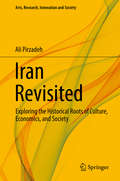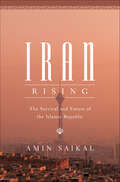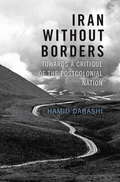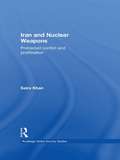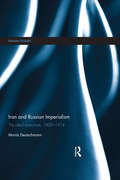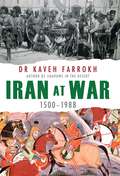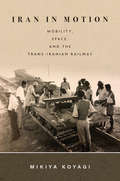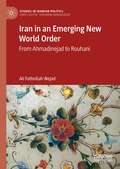- Table View
- List View
Iphigenia in Aulis
by EuripidesIn this new translation of Euripides' celebrated Greek tragedy, W.S. Merwin and George E. Dimock, Jr. offer a compelling look at the devastating consequence of 'man's inhumanity to man.' A stern critique of Greek culture, Iphigeneia at Aulis condemns the Trojan War by depicting the power of political ambition and the ensuing repercussions of thoughtlessly falling to the will of constituency. The translation impressively re-creates the broad array of moral and emotional tones conveyed by Euripides, with a comprehensive introduction, notes on the text, and a glossary of mythical and geographical terms.
Iphigenia in Tauris
by Euripides"The Iphigenia in Tauris is not in the modern sense a tragedy; it is a romantic play, beginning in a tragic atmosphere and moving through perils and escapes to a happy end. To the archaeologist the cause of this lies in the ritual on which the play is based. All Greek tragedies that we know have as their nucleus something which the Greeks called an Aition-a cause or origin. They all explain some ritual or observance or commemorate some great event." So begins the preface to "Iphigenia in Tauris" by Euripides as translated and prefaced by Gilbert Murray.
Ipswich in the Great War (Your Towns & Cities in the Great War)
by Rachel FieldHow did children in Ipswich help the war effort? Who was imprisoned in Ipswich for opposing the war? Where in the town was there thought to be a German military control centre?In this thoroughly researched and highly readable study of the Ipswich Home F
Ipswich: No. 1-6 (Images of America)
by Ipswich Historical Society William M. VarrellFounded in 1634, Ipswich is one of the oldest towns in America. It currently has more First Period houses still lived in than any other community in the United States. It was originally the home of Colonial governors, renowned furniture makers, sea captains, and the Heard family, who were giants in the China trade. Added to the early settlers were immigrant millworkers and millionaires who built summer mansions. As nearby towns with broader rivers and deeper harbors became commercial successes, Ipswich went into decline. It was this "hibernation" that enabled Ipswich to maintain its earliest homes, spectacular scenery, and local charm.Through more than two hundred vintage images, Ipswich takes the reader on an exciting journey through the history of this unique town. It presents the town's creative artists, the lives and occupations of its everyday citizens, beautiful landscapes, the mills and the country stores, and the ships and shipwrecks that met the Ipswich coast.
Iqbal: A Novel
by Francesco D'AdamoWhen young Iqbal is sold into slavery at a carpet factory, his arrival changes everything for the other overworked and abused chidren there. It is Iqbal who explains to them that despite their master's promises, he plans on keeping them as his slaves indefinetely. But it is also Iqbal who inspires the other children to look to a future free from toil...and is brave enough to show them how to get there. This moving fictionalized account of the real Iqbal Masih is told through the voice of Fatima, a young Pakistani girl whose life is changed by Iqbal's courage.
IrRational Music
by Elliott SharpA memoir and manifesto by a pivotal figure at the junction of rock, the avant-garde, and an ever-widening spiral of art, theater, film, and dance.For over five decades, Elliott Sharp has been engaged in a quest at once quixotic and down to earth: to take the music he hears in his inner ear and bring it to life in the real world. In this vivid memoir and manifesto, Sharp takes us along on that quest, through some of the most rugged, anarchically fertile cultural terrain of our time. Sharp, a mainstay of the New York Downtown scene beginning in the 1980s, has been a pivotal figure at the junction of rock, experimental music, and an ever-widening spiral of art, theater, film, and dance. Rooted in blues, rock, jazz, and the twentieth-century avant-garde, Sharp's innovative music has encompassed fractal geometry, chaos theory, algorithms, genetic metaphors, and new strategies for graphic notation.In IrRational Music, Sharp dodges fake cowboys' real bullets by the side of a highway near Colby, Kansas; is called on the carpet by a prickly, pompadoured Morton Feldman (&“Improvisation… I don't buy it&”); segues from Zen tea to single malt with an elfin John Cage; conjures an extraterrestrial opera from a group of high-school students in Munich; and—back in his own high-school days—looks up from strumming Van Morrison's &“Gloria&” in Manny's Music on 48th Street to see Jimi Hendrix smiling benignly upon him. A mix of tales from the road with thoughts on music, art, politics, technology, and the process of thinking itself, IrRational Music is a glimpse inside the mind of one of our most exacting, exciting creative artists.
Ira Fistell's Mark Twain: Three Encounters
by Ira FistellAn analysis of Mark Twain through his most famous writings.
Ira Hayes: The Akimel O'odham Warrior, World War II, and the Price of Heroism
by Tom HolmThe gripping, forgotten tale of Ira Hayes—a Native American icon and World War II legend who famously helped raise the flag at Iwo Jima but spent the latter half of his life haunted by being a war hero. IRA HAYES tells the story of Ira Hamilton Hayes from the perspective of a Native American combat veteran of the Vietnam generation. Hayes, along with five other Marines, was captured in Joe Rosenthal&’s iconic photograph of raising the stars and stripes on Mount Suribachi during the battle for the Japanese Island of Iwo Jima. The photograph was the inspiration and model for the U.S. Marine Corps War Memorial in Arlington. Between the time he helped raise that flag and his death—and beyond—he was the subject of more newspaper columns than any other Native person. He was hailed as a hero and maligned as a chronic alcoholic unable to take care of himself. IRA HAYES explores these fluctuating views of Ira Hayes. It reveals that they were primarily the product of American misconceptions about Native people, the nature of combat, and even alcoholism. Like most surviving veterans of combat, Ira did not think of himself as a heroic figure. There can be no doubt that Ira suffered from PTSD, which is a compound of survivor&’s guilt, the shock of seeing death, especially of one&’s friends, and the isolation brought on by feeling that no one could understand what he had been through. Ira&’s life has been a subject of two motion pictures and a television drama. All these dramas sympathize with him, but ultimately fail to see his binge drinking as his way of temporarily escaping the melancholy, the rage he felt, his sense of betrayal, and the sheer boredom of peacetime. IRA HAYES breaks apart the complexities of Ira&’s short life in honor of all Native veterans who have been to war in the service of the United States. This is equally their story.
Ira Township
by Paul Torney Gail Zabowski Richard Gonyeau Bob Mack Lynn LyonIn 1679, French explorer Fr. Louis Hennepin planted a cross on the shore of Anchor Bay beside Michigan's Lake St. Clair. There, Ira Township was incorporated on March 11, 1837, and the Immaculate Conception Catholic Church was founded. A settlement called Anchorville, for Anchor Bay, formed around the church. Down the road was another community, first called Swan Creek and later known as Fair Haven. Ira Township was once the nexus for the Interurban Railroad, had one of the first oxen-driven railroads in the state, and has one of the oldest Little League baseball organizations in the country. Shipbuilding has long been a major industry of the area, and the winter carnival known as Shantytown attracts hundreds of ice fishermen to Ira each winter.
Ira del vengador: Warthog in Afghanistan
by Steve StoneAvenger Wrath es la historia de un Hog Driver y su viaje durante la guerra en Afganistán, que opera desde la base aérea de Bagram con la hermosa, aunque mortal, cadena montañosa afgana como telón de fondo. El A-10 vio un uso casi constante en Afganistán, demostrando una vez más, como una plataforma de armas formidable y capaz. Esta versión revisada y actualizada del libro se ha vuelto más conmovedora ya que el F-35 tiene la oportunidad de demostrar que puede asumir el papel del A-10. El A-10 permanecerá en servicio hasta al menos 2022, con extensión de vida, quizás hasta 2040. Equipado con el GAU-8 Avenger, se descubrió que un cañón de 30 mm, diseñado para atravesar la armadura del tanque, era tan bueno para atravesar las gruesas paredes de barro de los complejos en los que los talibanes a menudo se refugiaban para montar emboscadas a las tropas de la coalición. Tiene una capacidad de supervivencia como ninguna otra aeronave actualmente en funcionamiento y ha llevado a su piloto de regreso a un estado que habría causado que otras aeronaves se hayan estrellado. Siga esta historia de alto octanaje basada en operaciones reales y obtenga una visión emocionante de un avión increíble.
Iran
by Hamid DabashiIn this unprecedented book, Hamid Dabashi provides a provocative account of Iran in its current resurrection as a mighty regional power. Through a careful study of contemporary Iranian history in its political, literary, and artistic dimensions, Dabashi decouples the idea of Iran from its colonial linkage to the clich#65533; notion of "the nation-state," and then demonstrates how an "aesthetic intuition of transcendence" has enabled it to be re-conceived as a powerful nation. This rebirth has allowed for repressed political and cultural forces to surface, redefining the nation's future beyond its fictive postcolonial borders and autonomous from the state apparatus that wishes but fails to rule it. Iran's sovereignty, Dabashi argues, is inaugurated through an active and open-ended self-awareness of the nation's history and recent political and aesthetic instantiations, as it has been sustained by successive waves of revolutionary prose, poetry, and visual and performing arts performed categorically against the censorial will of the state.
Iran
by Negin NabaviA translation of Iranian Documents from the early nineteenth century as to the 21st Century which shed light on aspects of political, social and intellectual history of modern Iran. Covering the period from the early nineteenth century to the present day, this reader brings together primary sources in translation that shed light on aspects of the political, social, cultural and intellectual history of modern Iran. It makes use of a combination of documents that include newspapers and the periodical press, diaries, memoirs, letters, speeches, and essays that have been translated here for the first time from Persian. It focuses on the momentous changes that society went through not only in terms of political events and developments, but also in terms of ideas, perceptions, and mindsets.
Iran
by William Mark HabeebIran-or Persia, as it was known until the 1930s-is home to one of the world's oldest cultures. Over the years it has exerted a great influence over its neighbors in the Middle East and Central Asia. Although Iran was once a close ally of the United States, in 1979 supporters of the Islamic fundamentalist cleric Ayatollah Ruhollah Khomeini overthrew the government and instituted a new one based on strict interpretation of Islamic law. In the years since then, U.S.-Iranian relations have been hostile. Today, however, Iran is once again undergoing an internal struggle. Iranians-particularly the younger generation-are trying to reconcile the changes that followed the 1979 Islamic Revolution with the needs and requirements of life in the 21st century. The outcome of this struggle between religious conservatives and the reformers will determine Iran's future. Discusses the geography, history, economy, government, religion, people, foreign relations, and major cities of Iran.
Iran After the Bomb: How Would a Nuclear-Armed Tehran Behave?
by Alireza NaderThis study explores how a nuclear-armed Iran would behave and what this would entail for the United States and its main regional allies. It analyzes the Islamic Republic's ideology, motivations, and national security doctrine; examines a nuclear-armed Iran's potential policies toward Saudi Arabia and the GCC; discusses its potential behavior toward Israel; explores its relations with terrorist groups; and presents key findings.
Iran Between Two Revolutions (Princeton Studies on the Near East)
by Ervand AbrahamianEmphasizing the interaction between political organizations and social forces, Ervand Abrahamian discusses Iranian society and politics during the period between the Constitutional Revolution of 1905-1909 and the Islamic Revolution of 1977-1979. Presented here is a study of the emergence of horizontal divisions, or socio-economic classes, in a country with strong vertical divisions based on ethnicity, religious ideology, and regional particularism. Professor Abrahamian focuses on the class and ethnic roots of the major radical movements in the modem era, particularly the constitutional movement of the 1900s, the communist Tudeh party of the 1940s, the nationalist struggle of the early 1950s, and the Islamic upsurgence of the 1970s.In this examination of the social bases of Iranian politics, Professor Abrahamian draws on archives of the British Foreign Office and India Office that have only recently been opened; newspaper, memoirs, and biographies published in Tehran between 1906 and 1980; proceedings of the Iranian Majles and Senate; interviews with retired and active politicians; and pamphlets, books, and periodicals distributed by exiled groups in Europe and North America in the period between 1953 and 1980.Professor Abrahamian explores the impact of socio-economic change on the political structure, especially under the reigns of Reza Shah and Muhammad Reza Shah, and throws fresh light on the significance of the Tudeh party and the failure of the Shah's regime from 1953 to 1978.
Iran Reframed: Anxieties of Power in the Islamic Republic (Stanford Studies in Middle Eastern and Islamic Societies and Cultures)
by Narges BajoghliAn inside look at what it means to be pro-regime in Iran, and the debates around the future of the Islamic Republic. More than half of Iran's citizens were not alive at the time of the 1979 Revolution. Now entering its fifth decade in power, the Iranian regime faces the paradox of any successful revolution: how to transmit the commitments of its political project to the next generation. New media ventures supported by the Islamic Republic attempt to win the hearts and minds of younger Iranians. Yet members of this new generation—whether dissidents or fundamentalists—are increasingly skeptical of these efforts. Iran Reframed offers unprecedented access to those who wield power in Iran as they debate and define the future of the Republic. Over ten years, Narges Bajoghli met with men in Iran's Revolutionary Guard, Ansar Hezbollah, and Basij paramilitary organizations to investigate how their media producers developed strategies to court Iranian youth. Readers come to know these men—what the regime means to them and their anxieties about the future of their revolutionary project. Contestation over how to define the regime underlies all their efforts to communicate with the public. This book offers a multilayered story about what it means to be pro-regime in the Islamic Republic, challenging everything we think we know about Iran and revolution.
Iran Revisited
by Ali PirzadehThis book examines Modern Iran through an interdisciplinary analysis of its cultural norms, history and institutional environment. The goal is to underline strengths and weaknesses of Iranian society as a whole, and to illustrate less prescriptive explanations for the way Iran is seen through a lens of persistent collective conduct rather than erratic historical occurrences. Throughout its history, Iran has been subject to many studies, all of which have diagnosed the country's problem and prescribed solutions based on certain theoretical grounds. This book intends to look inward, seeking cultural explanations for Iran's perpetual inability to improve its society. The theme in this book is based on the eloquent words of Nasir Khusrau, a great Iranian poet: "az mast ki bar mast". The words are from a poem describing a self-adoring eagle that sees its life abruptly ended by an arrow winged with its own feathers--the bird is doomed by its own vanity. The closest interpretation of this idiom in Western Christian culture is "you reap what you sow", which conveys a similar message that underlines one's responsibility in the sense that, sooner or later, we must face the choices we make. This would enable us to confront - and live up to - what Iran's history and culture have taught us.
Iran Rising: The Survival and Future of the Islamic Republic
by Amin SaikalAn authoritative account of how and why the Islamic Republic has survived to become a critical player in the Middle East and the worldWhen Iranians overthrew their monarchy, rejecting a pro-Western shah in favor of an Islamic regime, many observers predicted that revolutionary turmoil would paralyze the country for decades to come. Yet forty years after the 1978–79 revolution, Iran has emerged as a critical player in the Middle East and the wider world, as demonstrated in part by the 2015 international nuclear agreement. In Iran Rising, renowned Iran specialist Amin Saikal describes how the country has managed to survive despite ongoing domestic struggles, Western sanctions, and countless other serious challenges.Saikal explores Iran’s recent history, beginning with the revolution, which set in motion a number of developments, including war with Iraq, precarious relations with Arab neighbors, and hostilities with Israel and the United States. He highlights the regime’s agility as it navigated a complex relationship with Afghanistan during the Soviet invasion, survived the Gulf wars, and handled fallout from the Iraqi and Syrian crises. Such success, Saikal maintains, stems from a distinctive political order, comprising both a supreme Islamic leader and an elected president and national assembly, which can fuse religious and nationalist assertiveness with pragmatic policy actions at home and abroad.But Iran’s accomplishments, including its nuclear development and ability to fight ISIS, have cost its people, who are desperately pressuring the ruling clerics for economic and social reforms—changes that might in turn influence the country’s foreign policy. Amid heightened global anxiety over alliances, terrorism, and nuclear threats, Iran Rising offers essential reading for understanding a country that, more than ever, is a force to watch.
Iran Under the Pahlavi Monarchy: Essays in Iranian History, Politics, Culture and Literature (Iranian Studies)
by Homa KatouzianBringing together eighteen essays from Homa Katouzian, this book explores Iranian history, politics, culture and Persian literature from mediaeval times through the nineteenth century and into the contemporary period.Beginning with an overview of mediaeval Iranian history, the book then considers developments in the nineteenth century leading to the Constitutional Revolution of 1906-1911, which resulted in the fall of the Qajar dynasty (1785-1925). This is followed by a comprehensive overview of the Pahlavi monarchy (1925-1979) and a new and original analysis of the Iranian Revolution of February 1979. The book also includes essays on modern and classical Persian literature, encompassing Persian poetry and politics (1919-1925), the hitherto unstudied humour in Sadeq Hedayat’s life and works, a critical study of Forugh Farrokhzad, a study of Persian literary devices with special reference to the great Persian classic Sa‘di, and a study of Sa‘di as a lover of beauty and advocate of human morality.The book analyses Iran in a way that has seldom been done in one single volume – the history of the Qajar and Pahlavi dynasties, the two great revolutions in the twentieth century, and the unfamiliar nature of state and society in Iranian history, as well as some of the high points in modern and classical Persian literature – and is vital reading for anyone interested in the Middle East.
Iran Without Borders: Towards a Critique of the Postcolonial Nation
by Hamid DabashiA history of the cosmopolitan forces that made contemporary Iran "No ruling regime," writes Hamid Dabashi, "could ever have a total claim over the idea of Iran as a nation, a people." For decades, the narrative about Iran has been dominated by a false binary, in which the traditional ruling Islamist regime is counterposed to a modern population of educated, secular urbanites. However, Iran has for many centuries been a nation forged from a diverse mix of influences, most of them non-sectarian and cosmopolitan. In Iran Without Borders, the acclaimed cultural critic and scholar of Iranian history Hamid Dabashi traces the evolution of this worldly culture from the eighteenth century to the present day, journeying through social and intellectual movements, and the lives of writers, artists and public intellectuals who articulated the idea of Iran on a transnational public sphere. Many left their homeland--either physically or emotionally--and imagined it from places as far-flung as Istanbul, Cairo, Calcutta, Paris, or New York, but together they forged a nation as worldly as it is multifarious.From the Hardcover edition.
Iran and Nuclear Weapons: Protracted Conflict and Proliferation (Routledge Global Security Studies)
by Saira KhanThis book investigates what is driving Iran's nuclear weapons programme in a less-hostile regional environment, using a theory of protracted conflicts to explicate proliferation. Iran’s nuclear weapons program has alarmed the international community since the 1990s, but has come to the forefront of international security concerns since 2000. This book argues that Iran’s hostility with the United States remains the major causal factor for its proliferation activities. With the US administration pursuing aggressive foreign policies towards Iran since 2000, the latter’s security threat intensified. A society that is split on many important domestic issues remained united on the issue of nuclear weapons acquisition after the US war in Iraq. Consequently, Iran became determined in its drive to acquire nuclear weapons and boldly announced its decision to enrich uranium, leaving the US in no doubt about its nuclear status. This book underscores the importance of protracted conflicts in proliferation decisions, and underpinning this is the assumption that non-proliferation may be achieved through the termination of intractable conflicts. The aims of this work are to demonstrate that a state’s decision to acquire nuclear weapons depends largely on its engagement in protracted conflicts, which shows not only that the presence of nuclear rivals intensifies the nuclear ambition, but also that non-nuclear status of rival states can promote non-proliferation incentives in conflicting states inclined to proliferate. This study will be of great interest to students of Iran, Middle Eastern politics, nuclear proliferation and international relations theory. Saira Khan is a Research Associate in the McGill-University of Montreal Joint Research Group in International Security (REGIS).
Iran and Russian Imperialism: The Ideal Anarchists, 1800-1914 (Iranian Studies)
by Moritz DeutschmannRather than a centralized state, Iran in the nineteenth century was a delicate balance between tribal groups, urban merchant communities, religious elites, and an autocratic monarchy. While Russia gained an increasingly dominant political role in Iran over the course of this century, Russian influence was often challenged by banditry on the roads, riots in the cities, and the seeming arbitrariness of the Shah. Iran and Russian Imperialism develops a comprehensive picture of Russia’s historical entanglements with one of its most important neighbours in Asia. It recounts how the Russian Empire strived to gain political influence at the Persian court, promote Russian trade, and secure the enormous southern borders of the empire. Using hitherto often neglected documents from archives in Russia and Georgia and reading them against the grain, this book reveals the complex reactions of different groups in Iranian society to Russian imperialism. As it turns out, the Iranians were, in the words of the Russian orientalist Konstantin Smirnov, "ideal anarchists," whose resistance to imperial domination, as well as to centralized state institutions more generally, impacted developments in the region in the century to come. Iran’s troubled relationship with the wider world continues to be a topic of considerable interest to historians, yet little focus has been given to Russia’s historical connections to Iran. This book thus represents a valuable contribution to Iranian and Russian History, as well as International Relations.
Iran at War: 1500-1988
by Kaveh FarrokhIran's complex, violent military history encompasses two world wars, foreign intervention, anti-government revolts, border disputes, a revolution, a war against Iraq that lasted over eight years, and its desperate quest to become a nuclear power. Following his award-winning book, Shadows in the Desert, which explored the military history of ancient Persia, in Iran at War Kaveh Farrokh turns his attention to modern Iran's wartime history. Beginning with the Safavid dynasty of the 16th and 17th centuries, he traces Iran's political and military progress to its dramatic turning point in 1979. In doing so, Farrokh demonstrates how Iran's current bellicosity on the world stage was shaped by centuries of military defeat and humiliating foreign influences from the likes of Russia and Great Britain. Including illustrations and photographs, this book provides an unparalleled investigation into the bloody history of modern Iran.
Iran in Motion: Mobility, Space, and the Trans-Iranian Railway
by Mikiya KoyagiCompleted in 1938, the Trans-Iranian Railway connected Tehran to Iran's two major bodies of water: the Caspian Sea in the north and the Persian Gulf in the south. Iran's first national railway, it produced and disrupted various kinds of movement—voluntary and forced, intended and unintended, on different scales and in different directions—among Iranian diplomats, tribesmen, migrant laborers, technocrats, railway workers, tourists and pilgrims, as well as European imperial officials alike. Iran in Motion tells the hitherto unexplored stories of these individuals as they experienced new levels of mobility. Drawing on newspapers, industry publications, travelogues, and memoirs, as well as American, British, Danish, and Iranian archival materials, Mikiya Koyagi traces contested imaginations and practices of mobility from the conception of a trans-Iranian railway project during the nineteenth-century global transport revolution to its early years of operation on the eve of Iran's oil nationalization movement in the 1950s. Weaving together various individual experiences, this book considers how the infrastructural megaproject reoriented the flows of people and goods. In so doing, the railway project simultaneously brought the provinces closer to Tehran and pulled them away from it, thereby constantly reshaping local, national, and transnational experiences of space among mobile individuals.
Iran in an Emerging New World Order: From Ahmadinejad to Rouhani (Studies in Iranian Politics)
by Ali Fathollah-NejadThis book critically develops and discusses Iran’s geopolitical imaginations and explores its various foreign-policy schools of thought and their controversies. In doing so, the book covers Iran's foreign policy and international relations from "9/11" all the way to Rouhani’s rise (late 2014). Accounting for both domestic and the international balance of power, the book theorizes the post-unipolar world order of the 2000s, dubbed “imperial interpolarity”, examines Iran’s relations with non-Western great-powers in that era, and offers a critique of the “Rouhani doctrine” and its economic and foreign-policy visions.Forged in the fires and intense deliberations of a PhD, undertaken at a most unique institution of higher learning in the world, Ali Fathollah-Nejad has produced one of the most informative and evocative studies of Iran’s foreign policy and international relations to date. Framed in a highly original theoretical approach, Ali’s nuanced analysis, drawing on a lorry load of primary and secondary sources, details the process and context of policy in the Islamic Republic, thus producing an unrivalled and lasting account of modern Iran’s worldview and the behaviour of this revolutionary state in a fast-changing world.—Anoush Ehteshami, Professor of International Relations & Director of the Institute for Middle Eastern and Islamic Studies, School of Government and International Affairs, Durham University (UK)Empirically rich and theoretically sophisticated, Iran in an Emerging New World Order flashes out the key drivers behind Iran’s international relations since the mid-2000s. Providing evidence for the material and geopolitical significance of Iran’s identity constructions, the book enriches the debate on the Islamic Republic’s foreign policy and bridges the divide between the discipline of IR and area studies.—Fawaz A. Gerges, Professor of International Relations & inaugural Director, LSE Middle East Centre (2010–13), London School of Economics and Political Science (LSE); author of the forthcoming The 100 Years' War for Control of the Middle East (Princeton University Press, 2021).Ali Fathollah-Nejad has established himself as one of the most insightful observers of Iranian politics. Providing the analytical background to his assessments of Tehran’s foreign policy in the 21st century, this book comes out opportunely at a time when a new U.S. administration is about to re-engage with Iran.—Gilbert Achcar, Professor of Development Studies and International Relations, SOAS (School of Oriental and African Studies) University of LondonA decisive contribution to two avant-gardist fields of knowledge: Critical geopolitics and Iranian foreign relations. Anyone interested in cutting-edge research that brings together International Relations and Iranian Studies will revel in this important book.—Arshin Adib-Moghaddam, Professor in Global Thought and Comparative Philosophies, Department of Politics and International Studies & former Chair (2012–18), Centre for Iranian Studies, SOAS University of LondonOne of the few to have a thorough, beyond-the-headlines and forward-looking grasp of Iran, Ali Fathollah-Nejad offers a brilliant analysis of what is in store for Iran. A must-read for anybody interested in geopolitics.—Florence Gaub, Deputy Director & Director of Research, European Union Institute for Security Studies (EUISS), ParisIt is no longer possible to think of any nation-state without simultaneously seeing the reflection of an entire changing world in it. Ali Fathollah-Nejad’s prose and politics in Iran in an Emerging New World Order is the state-of-the-art mapping of the epistemic shift that seeks to understand the global in the local, and the domestic in the foreign. The result is a mode of supple and symbiotic thinking that reveals the way transnational politics dwells on the borderline where the fate of nations unravels into the fold of a dysfunctional diso
